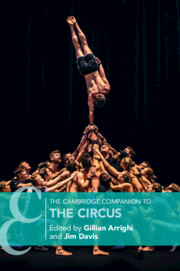Book contents
- The Cambridge Companion to the Circus
- Cambridge Companions to Theatre and Performance
- The Cambridge Companion to the Circus
- Copyright page
- Contents
- Figures
- Contributors
- Acknowledgements
- Timeline
- Introduction
- Part I Transnational Geographies of the Modern Circus
- Part II Circus Acts and Aesthetics
- Part III Circus
- Part IV Circus Studies Scholarship
- Chapter 15 Methodologies in Circus Scholarship
- Chapter 16 Through the Looking Glass
- Bibliography
- Index
- References
Chapter 15 - Methodologies in Circus Scholarship
from Part IV - Circus Studies Scholarship
Published online by Cambridge University Press: 22 June 2021
- The Cambridge Companion to the Circus
- Cambridge Companions to Theatre and Performance
- The Cambridge Companion to the Circus
- Copyright page
- Contents
- Figures
- Contributors
- Acknowledgements
- Timeline
- Introduction
- Part I Transnational Geographies of the Modern Circus
- Part II Circus Acts and Aesthetics
- Part III Circus
- Part IV Circus Studies Scholarship
- Chapter 15 Methodologies in Circus Scholarship
- Chapter 16 Through the Looking Glass
- Bibliography
- Index
- References
Summary
This chapter provides an overview and exploration of the methodological approaches employed by circus scholars in three edited collections published between 2016 and 2018. Reflecting the fact that the majority of published circus scholars have backgrounds in the humanities and social sciences, the chapters and articles in these collections largely employ three methodological approaches, which currently dominate circus research: history/historiography, performance analysis, and ethnography. While much circus research relies on archival sources, scholars working on contemporary circus – many of whom started their careers as circus artists – supplement this research with viewing of live performances and the use of ethnographic tools such as interviews and their own professional experience in their data collection. Of emerging importance is the use of social science methodologies such as interviews, surveys, and demographic data to explore and critique circus education, institutions, and spectatorship. Heeding Halberstam and Nyong’o’s call for a ‘rewilding of theory’ (2018), we further take account of emerging circus scholarship which insists on circus as a live, experiential set of practices and on the viability of methods which centre embodiment and note the centering of ethics in scholars’ exploration of circus training and performances, and in circus research itself.
Keywords
- Type
- Chapter
- Information
- The Cambridge Companion to the Circus , pp. 231 - 243Publisher: Cambridge University PressPrint publication year: 2021
References
Further Reading
- 1
- Cited by

